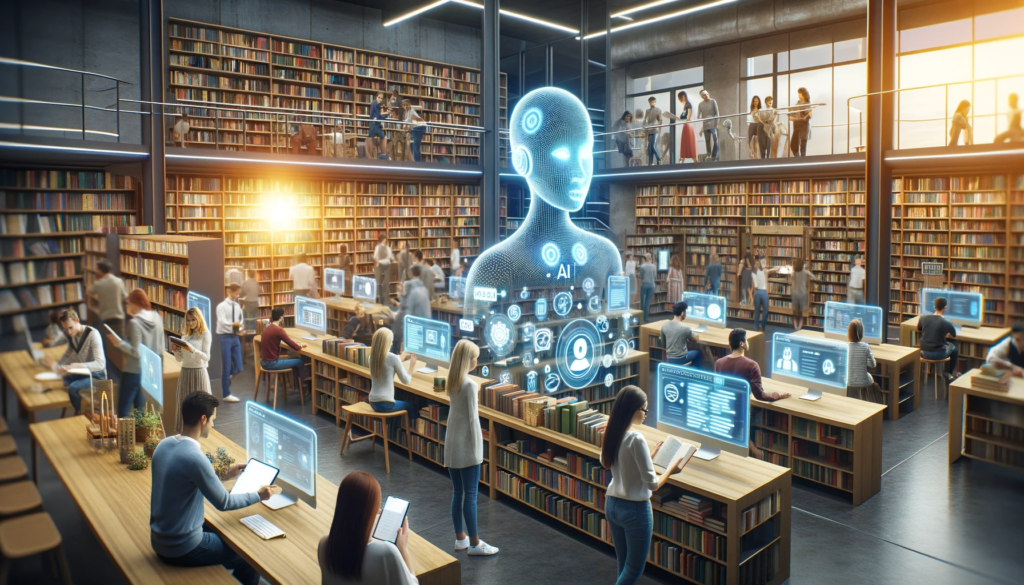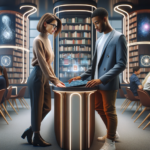 ChatGPT is a new artificial intelligence (AI) tool that has been getting endless buzz online due to its potential not only to improve our lives but also to disrupt established practices and institutions.
ChatGPT is a new artificial intelligence (AI) tool that has been getting endless buzz online due to its potential not only to improve our lives but also to disrupt established practices and institutions.
One such example is its ability to almost instantly generate well-written essays on just about any topic, which is forcing a radical rethinking of traditional methods of teaching writing in high school English and college composition classes.
One article even called it a “plague upon education” and likened it to a COVID-19-like pandemic.
Others have pondered ChatGPT’s effect on libraries, a world that has already been transformed profoundly by search engines and the seamless availability of information online.
This article will go over some possible ways ChatGPT can be used in and by libraries, but the primary takeaway is that it cannot be ignored and needs to be embraced now while it’s developing and we are still formulating social norms over its use.
With other disruptive technologies the response from institutions including libraries has been to ban it and pretend it doesn’t exist.
But AI isn’t going anywhere, and it will soon be available to anyone on their phone so banning it on college computers, for example, wouldn’t be an effective solution.
What’s more, libraries can’t point to it being illegal like in the case of other disruptive information tools, like SciHub.
But in my opinion this isn’t the right conversation to have; instead, we should be thinking about how quickly-evolving AI tools like ChatGPT can best be integrated into our work, both in terms of library tasks and workflows and in our work educating patrons on finding the information they need.
Let’s take a look at some of these.
AI: a Collaborator or Assistant for Everyday Library Tasks?
ChatGPT and AI tools have the ability to significantly aid a number of core library tasks, which has the potential to significantly lessen the burden on libraries of all types, especially those that are understaffed.
If AI can do the more mundane library tasks, it can free up time for more creative work and direct help for patrons.
A few such implementations could involve readers’ advisory, writing marketing copy, summarizing books and information resources, and helping plan displays by generating lists of books titles or quotes on a particular theme.
AI can perform many of these functions admirably even at this stage of its development and will only improve in the future.
AI and Information Literacy
ChatGPT also has the potential to be a very helpful tool for helping librarians answer research questions.
But my big long-term question is if the public will continue to ask librarians these questions that ChatGPT can help with, or will they just use it themselves and skip the library entirely?
In many ways, these are the same questions that were asked when Google took over information seeking. And it’s important to note that librarians are still the ones who have the experience professional judgment and can better interpret the ChatGPT output and combine it with their own knowledge.
And very often ChatGPT needs to be fed very specific questions in order to provide a useful answer, so expertise may still be needed for the framing of the query (often referred to as prompt engineering). It also lacks certain types of sources, including many books and articles hidden behind paywalls, in its training data.
In this way, AI speaks more broadly to how ChatGPT will affect information literacy. People go to libraries to get answers to their information-related questions, and a big part of the librarian toolkit is evaluating the credibility of Google search results and sources found through social media.
The emergence of ChatGPT and other AI tools within web search will radically change this by being the first time when a fully-formed, “consensus” answer can be generated in an automated manner without directly “showing the work” that led to its answer.
This is a definite issue for librarians, whose work is built around the very sources that may become even more invisible to people finding information to answer their questions.
How Does AI Cite Its Sources? A Major Issue
Even with Wikipedia, which was revolutionary in its own way and once vehemently opposed by many libraries, rigorous citation rules policed the ecosystem.
Early versions of ChatGPT didn’t cite its sources at all, but in the new version of Bing that incorporates the chatbot, websites do appear as sources and Microsoft has confirmed it will continue to do so.
In the academic world, as of this moment ChatGPT most often gives citations to sources like journal articles that sound real but in fact don’t exist (referred to as hallucinations).
These are all issues that need to be continuously monitored by libraries, both for practical purposes in educating their communities but also their own theoretical understanding. For example, how will AI affect our notions of information creation and authority?
AI Implementation in Academic Libraries
In the academic library context, librarians also may be able to leverage familiarity with AI tools to help faculty redesign or create new course assignments.
One major theme for college assignments in the age of AI is emphasizing the process (for example, how did you come up with and develop a main idea) rather than the final outcome, which could easily be generated by a bot.
Other ideas could include comparing and contrasting ChatGPT’s response to a query with what a student would have written, or to use ChatGPT to generate an alternative viewpoint to a point you are arguing.
As AI continues to develop, we may see searching for information gradually become less synonymous with “Googling” (although Google is hard at work integrating its own AI chatbot, Bard, into search results as well).
Updated 1/3/2024
Other AI Tools for Librarians
For some, AI is synonymous with ChatGPT and text generation, but there are plenty of other tools out there that librarians can benefit from (and should familiarize themselves with).
Other LLMs + AI-Enhanced Search: I’ve already mentioned Google Bard, and especially its integration of AI answers into search results. This can be an invaluable tool for librarians as they juggle reference questions at a busy service point (alongside verification and further exploration, of course).
Image Generators: Midjourney, Canva AI, and Adobe Firefly are all popular examples of image generators which can be used in a variety of contexts. Many library users need to create and use images for a variety of work and personal purposes and often have few quality options that aren’t copyrighted.
ChatPDF: One of the most interesting tools I’ve used so far allows you to upload a PDF and ask it questions about the content. I think this in particular could be hugely valuable for helping library users and the general public understand scholarly research and apply it to their own situations or interests in exiting new ways. It does a great job of summarizing content, explaining methods, and even coming up with weaknesses of a given paper.
(It’s also worth mentioning that many of the features available in specialized tools (image generation, file uploads, etc.) are also available within the premium version of ChatGPT.)
Overall, every librarian should recognize this as a new watershed moment for our field, like it is for so many others.




Leave a Reply